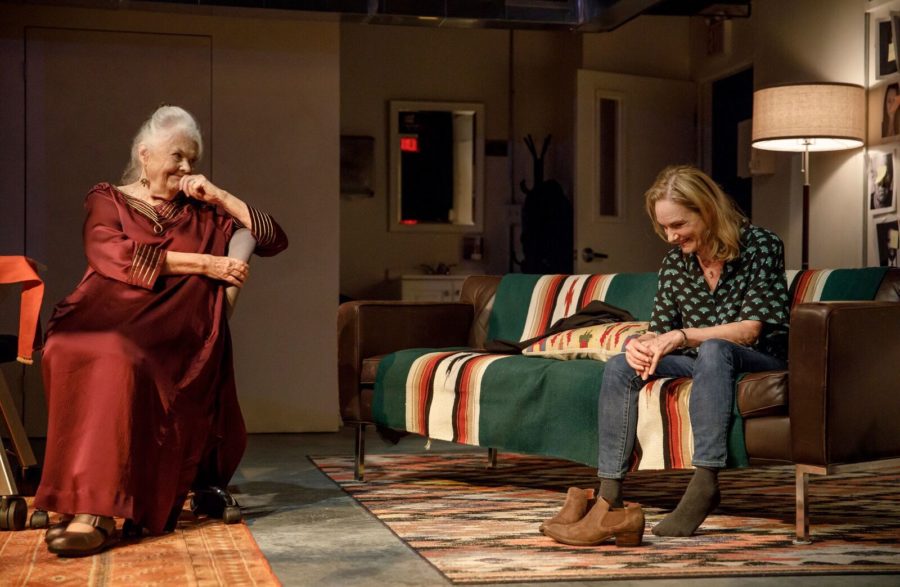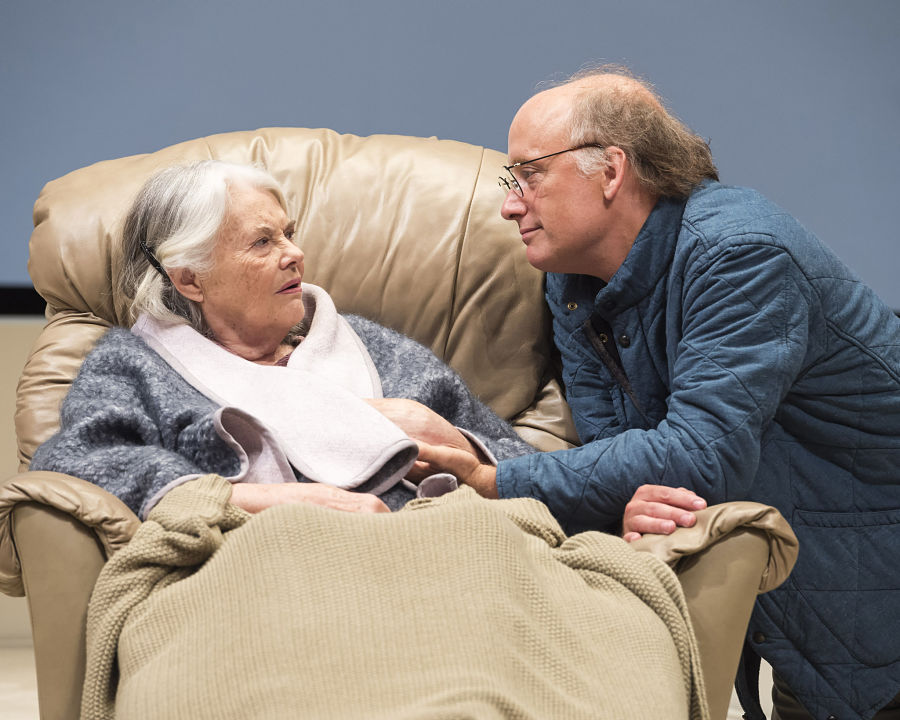Lois Smith is always up for a challenge. Smith has long been a staple of the American theatre, but in recent years she’s become a go-to actor for a new generation of writers, starring in new plays by the likes of Amy Herzog (After the Revolution), Annie Baker (the three-hour-long John), and Jordan Harrison (the sci-fi-ish Marjorie Prime, in a title role she reprised for the film adaptation).
Non-theatre folks may know her from her extensive TV and film work, including the role of a nun in Greta Gerwig’s Lady Bird, not to mention her auspicious 1955 film debut in East of Eden, opposite James Dean. But theatre is where her career is rooted: A member of Chicago’s Steppenwolf Theatre Company, Smith has two Tony nominations for Broadway productions of plays that originated at Steppenwolf, 1990’s Grapes of Wrath and 1996’s revival of Buried Child.
The 87-year-old Smith isn’t slowing down. This summer she starred in Peace for Mary Frances by Lily Thorne, for which she was onstage the entire time. And this month she appears in I Was Most Alive With You by Craig Lucas, about a man named Ash*, a former drug addict who is trying to figure out the reasons for his constant misfortune. The production, which features both Deaf and hearing actors, is currently running Off-Broadway at Playwrights Horizons through Oct. 14.
For this play, Smith is learning a new skill: American Sign Language. American Theatre caught up with her during tech.

DIEP TRAN: Your character has lines where she signs. Did you know sign language prior?
LOIS SMITH: No, not a bit. It was a little over a year ago that I had my first workshop of this play. And we met with the interpreters and the sign language people, who are just wonderful, and I began to learn a little bit. Within the last year, I had some videos and some ability to work on it in the meantime. But basically I did a cram course in the months before rehearsals began; I had a tutor to teach me sign language, and now we have all the people within the company, wonderful people to instruct us and teach us and watch us. It’s amazing.
How fluent are you now?
Oh, not good at all! In terms of being an ASL signer, I remember telling Sabrina Dennison, who is the artistic director of the sign aspect of the production, that I won’t be fluent, but the job is to make my character the proper amount of fluent!
Of course I would like to be better than that and speak more easily with this wonderful cast—each character has a Deaf actor playing the part also. It’s amazing being in the room. I’m very privileged to be part of it.
I Was Most Alive With You has some religious overtones. It references the Book of Job quite a bit…
I don’t know what you mean by religious. It certainly is a philosophical piece in so many ways. There are two main subjects, you might even say conditions: one is addiction and one is ASL. And those two conditions are extraordinarily expressed. That’s only the beginning, and then there’s the journey through the plot of the play.
I hadn’t thought of it in terms of religion. There’s a great deal about faith, belief—or not, and in what, and to what end, etc.
I loved you in Marjorie Prime.
I’m so happy to hear that, it’s a play I just adore.
You seem to be the go-to older actor for new plays!
I’m so fortunate. I’m very aware of how lucky I am, that at a time when the conventional wisdom is there will be fewer, less interesting parts, and it just has not been true to me. I’ve had more and more varied and interesting parts in recent years, more than ever.
What’s your secret?
My secret? I don’t know! Maybe you just hang around, maybe that’s it. [Laughs]
Just be the last one standing.
Yes right!

You’ve worked with the greats like Horton Foote and Tennessee Williams, and with younger playwrights like Annie Baker and Jordan Harrison. How do you think American playwriting has developed over time?
I’m certainly no expert on all of that. It’s an interesting thing. When I was working on Horton Foote’s Trip to Bountiful [the 2005 Off-Broadway revival at the Signature Theatre], it was one of my favorites. This play began in 1953 and it was a three-act play and it was done then on Broadway with big sets in three acts. But while we were in rehearsal Off Broadway, the director, Harris Yulin, had a view of how it would continue to play out—it wouldn’t stop, the scenery would disappear and appear together through all the various scenes. At one point, I think Horton said, “We could do this without an intermission.” It hadn’t been designed that way. I thought, what an extraordinary thing after that many years and that much success with this play, and here he was. And we did it. He made some changes and cuts, and it moved from beginning to end, the journey, without a stop. It was a truly satisfying, joyful thing to work on.
Horton was a wonderful presence. He loved actors, loved being in rehearsal, and it never stopped. The work and the joy in the work, that was a true treat.
Perhaps Horton knew that plays have to be shorter now.
Well, he made the choice to do it without stopping! But I believe plays, like life, tend to be faster these days. And so that is reflected in scripts very often and in the way they written and delivered.
What role do you wish you had played?
I always wish I had done more Shakespeare in my long life, and I did very little of it, aside from Measure for Measure in 1989. Nowadays some of the things I most would have loved to have done, I’ve outgrown. I think that’s one of the thing that’s not going to happen.
When you did Peace for Mary Francis, you were onstage almost the entire time. How do you make sure your memory is sharp when you’re doing something that rigorous?
Actually, as much as 25 years ago, I was about to do Mother Courage, and it was a very long part, and that was the first time I set out to study something very thoroughly, to memorize it ahead of time. I liked that process. You’re learning the play as you learn the lines, and the accuracy is so important and that’s a good way to get a good grip on the accuracy. It’s so easy for actors to paraphrase, we all do it, it’s something one has to fight against. Because exactly the way the author wrote it is the way we want to do it. So that time with myself and the play and memorizing has become valuable to me.
Rehearsal periods in my long life have gotten shorter, as an economic matter mostly. It means that rehearsal time gives you less wiggle room to find your way. So being able to be off book really early, being able to look in the eyes of your partner and not at the book… There is no substitute for time. That’s become a mantra for me. There’s no substitute for time in preparing a play and rehearsing a play. And we do tend to keep shortening it.
How long were rehearsals before?
The normal was at least four weeks, before tech. Now I’ve actually been in things where you’re in tech at the end of the third week, and that’s terribly fast. I’ve been working a lot Off Broadway, which tends to be where new plays are. Now once you get through tech and are really exhausted, then comes the first preview and then usually three weeks of previews, and that means you’re rehearsing all afternoon and playing at night. And by the time opening night comes, one is so tired—that’s really, really rough.
That does sound rough. What keeps you doing it?
I love working. It’s good for me, it’s good for my mental health, though there are a few times when I get extremely cranky. It’s only worth it to do good work, and if I feel that I’m not doing good work, that’s the most distressing. You just have to come back each day and think, well, get it better!
*A previous version of this story mistakingly characterized Ash of I Was Most Alive With You as Deaf. That has been corrected.


